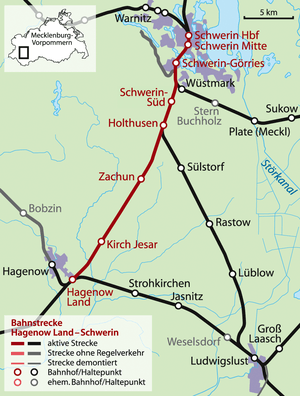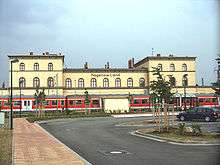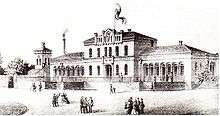Hagenow Land–Schwerin railway
| Hagenow Land–Schwerin | |||||||||||||||||||||||||||||||||||||||||||||||||||||||||||||||||||||||||||||||||||||||||||||
|---|---|---|---|---|---|---|---|---|---|---|---|---|---|---|---|---|---|---|---|---|---|---|---|---|---|---|---|---|---|---|---|---|---|---|---|---|---|---|---|---|---|---|---|---|---|---|---|---|---|---|---|---|---|---|---|---|---|---|---|---|---|---|---|---|---|---|---|---|---|---|---|---|---|---|---|---|---|---|---|---|---|---|---|---|---|---|---|---|---|---|---|---|---|
 | |||||||||||||||||||||||||||||||||||||||||||||||||||||||||||||||||||||||||||||||||||||||||||||
| Route number: | 100 | ||||||||||||||||||||||||||||||||||||||||||||||||||||||||||||||||||||||||||||||||||||||||||||
| Line number: | Hagenow-Holthusen: 6442 Holthusen-Schwerin: 6441 | ||||||||||||||||||||||||||||||||||||||||||||||||||||||||||||||||||||||||||||||||||||||||||||
| Line length: | 38.6 | ||||||||||||||||||||||||||||||||||||||||||||||||||||||||||||||||||||||||||||||||||||||||||||
| Track gauge: | 1435 | ||||||||||||||||||||||||||||||||||||||||||||||||||||||||||||||||||||||||||||||||||||||||||||
| Voltage: | 15 kV 16.7 Hz AC | ||||||||||||||||||||||||||||||||||||||||||||||||||||||||||||||||||||||||||||||||||||||||||||
| Maximum speed: | Hagenow–Schwerin Mitte: 160 | ||||||||||||||||||||||||||||||||||||||||||||||||||||||||||||||||||||||||||||||||||||||||||||
Legend
| |||||||||||||||||||||||||||||||||||||||||||||||||||||||||||||||||||||||||||||||||||||||||||||
The Hagenow–Schwerin railway is a double track electrified mainline railway in the German state of Mecklenburg-Vorpommern. It is the second oldest railway in Mecklenburg after the Berlin-Hamburg railway and one of the oldest railways in Germany, opened in 1847 by the Mecklenburg Railway Company (German: Mecklenburgische Eisenbahngesellschaft).
Route
 Hagenow Land station |
 First station building in Schwerin 1847 |
The line runs in an almost straight line from Hagenow Land station (east of the town of Hagenow) northeast through wooded areas to Schwerin. From Holthusen, where the line from Ludwigslust joins, it runs almost due north towards Schwerin. Before Schwerin-Görries the line from Parchim connects. The railway crosses Schwerin in a cutting.
History
The Berlin–Hamburg line, opened in 1846, was the first railway passing through the Grand Duchy of Mecklenburg-Schwerin. Immediately afterwards Mecklenburg-Schwerin began work on a link from Hagenow to Schwerin, which was opened on 1 May 1847. In the following years the line was extended to Wismar, Rostock and Güstrow.
Initially, two pairs of trains a day ran between Rostock and Hagenow with connections to services to Wismar and Güstrow. The construction of additional railway lines decreased the importance of this route. The Lübeck–Bad Kleinen line, which opened in 1870, diverted traffic to Hamburg via Lübeck. The opening of the Ludwiglust–Holthusen line in 1888, diverted traffic towards Berlin and Magdeburg from the section of line south of Holthusen and it was subsequently mainly used for local traffic. For example, in 1905 there were five pairs of passenger train between Hagenow Land station and Schwerin and six in 1934, some continiong to Wismar. In the 1980s there were four pairs of trains, which continued to the border station of Schwanheide. Added to this was a pair of express trains and one interzonal train (travelling between East and West Germany) between Berlin and Hamburg.
In the 1990s, the route gained importance. With the expansion and electrification of the Berlin–Hamburg line, the route to Hamburg from Rostock via Hagenow was faster than via Lübeck. In 1996, the line was duplicated and electrified as a German Unity Transport Project and upgraded to allow a top speed of 160 km/h.
Current operations
The line is served by Regional-Express trains on the Rostock–Hamburg route (branded as Hanse-Express) every two hours. It is also served every the two hours by InterCity trains on the (Binz–) Stralsund–Rostock–Schwerin–Hamburg route and continuing to western or south western Germany. Between Schwerin and Hagenow Land station Regionalbahn trains also run, which connect to Hagenow town station.
References
- Schultz, Lothar (1992). Eisenbahnen in Mecklenburg (in German). Berlin: transpress. ISBN 3-344-70732-9.
| Wikimedia Commons has media related to Hagenow Land–Schwerin railway. |